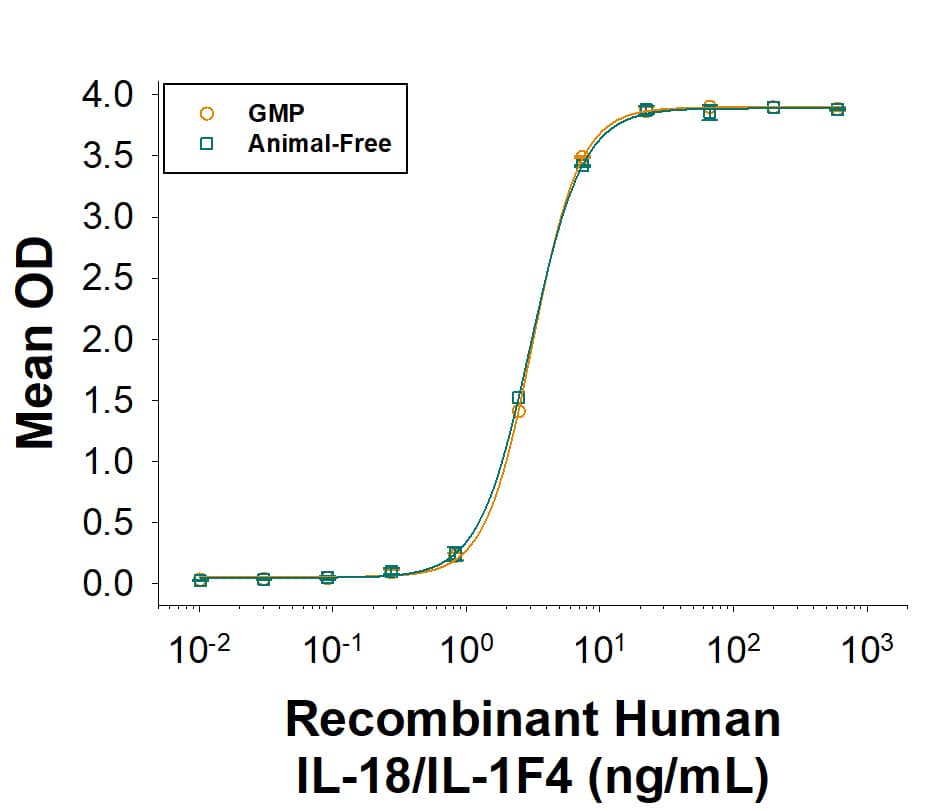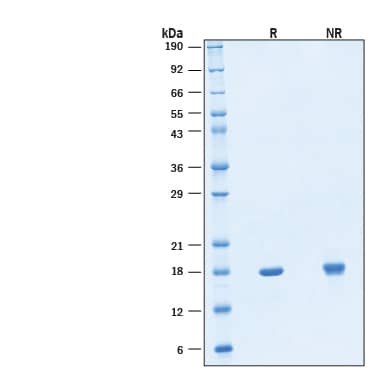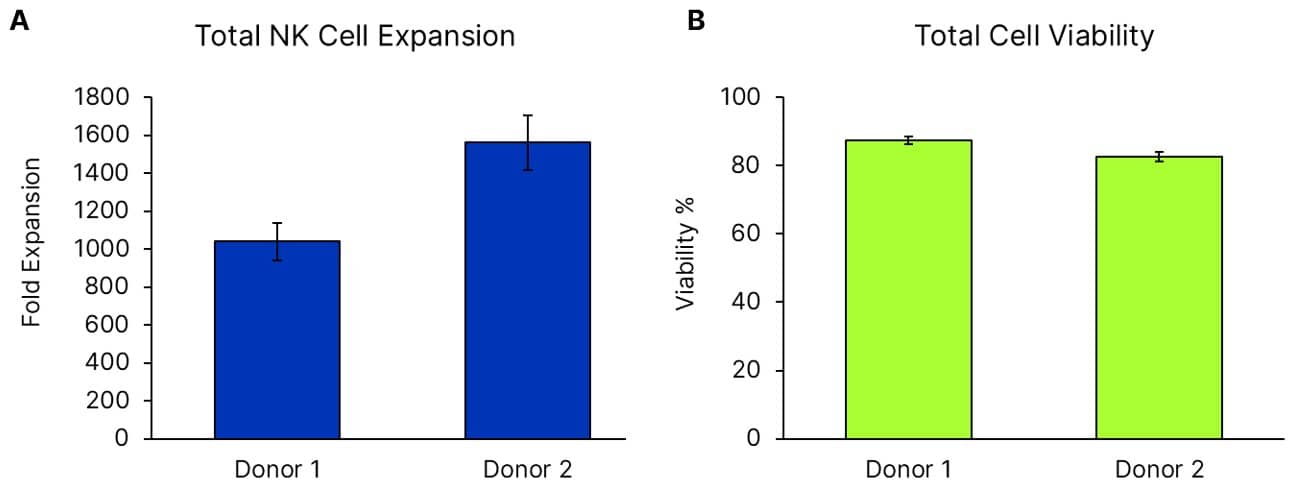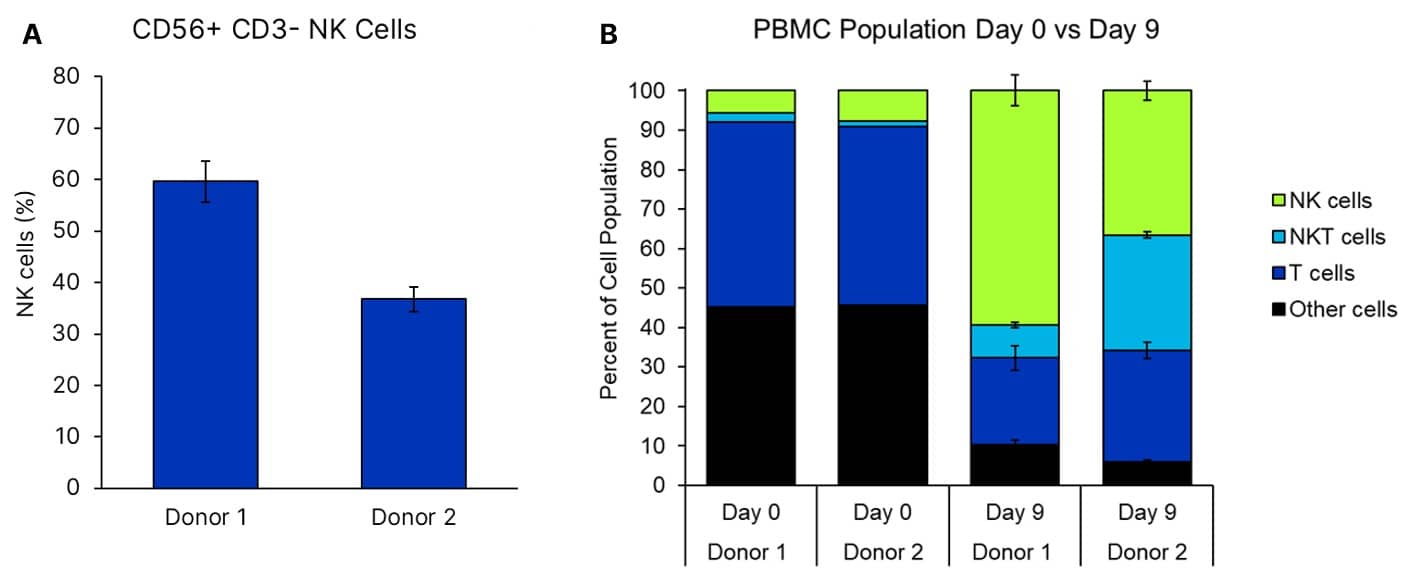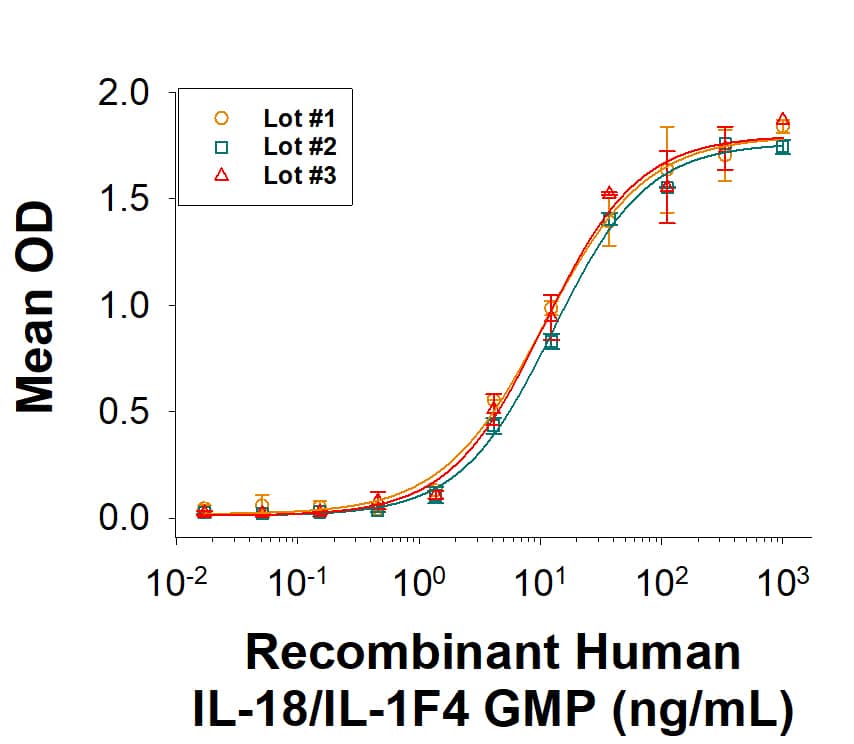Recombinant Human IL-18/IL-1F4 GMP Protein, CF GMP
R&D Systems, part of Bio-Techne | Catalog # BT-018-GMP

Key Product Details
- IL-18 Manufactured in Bio-Techne's new GMP facility
- Lot-to-lot consistency
- Stringent guidelines for patient safety
- Scalability necessary to support successful therapeutics
- Learn more about manufacturing in our new GMP facility
- Test it in your process! Request a sample of GMP IL-18
Product Specifications
Source
E. coli-derived human IL-18/IL-1F4 protein
Tyr37-Asp193
Produced using non-animal reagents in an animal-free laboratory.Manufactured and tested under cGMP guidlines.
Tyr37-Asp193
Produced using non-animal reagents in an animal-free laboratory.Manufactured and tested under cGMP guidlines.
Purity
>97%, by SDS-PAGE with quantitative densitometry by Coomassie® Blue Staining. The molecular weight by mass spectrometry is 18205 Da ± 5 Da.
Endotoxin Level
<0.10 EU per 1 μg of the protein by the LAL method.
N-terminal Sequence Analysis
Tyr37-Phe-Gly-Lys-Leu-Glu-Ser-Lys-Leu-Ser
Predicted Molecular Mass
18 kDa
SDS-PAGE
18 kDa, under reducing conditions.
Activity
Measured by its ability to induce IFN-gamma secretion by KG-1 human acute myelogenous leukemia cells in the presence of TNF-alpha.
The ED50 for this effect is 1.25-15.0 ng/mL.
The ED50 for this effect is 1.25-15.0 ng/mL.
The specific activity of GMP Recombinant Human IL-18/IL-1F4 is > 5.00 x 106 units/mg, which is calibrated against the human IL-18 WHO Standard (NIBSC code: 03/200).
Host Cell Protein
<0.200 ng per μg of protein when tested by ELISA.
Mycoplasma
Negative for Mycoplasma.
Host Cell DNA
<0.00150 ng per µg of protein when tested by PCR.
Scientific Data Images for Recombinant Human IL-18/IL-1F4 GMP Protein, CF
Recombinant Human IL-18/IL-1F4 GMP Protein Bioactivity.
The bioactivity of Recombinant Human IL-18/IL-1F4 GMP Protein (Catalog # BT-018-GMP) was measured by its ability to induce IFN-gamma secretion by KG-1 human acute myelogenous leukemia cells in the presence of TNF-alpha. Three independent lots were tested for bioactivity and plotted on the same graph to show lot-to-lot consistency of GMP IL-18/IL-1F4 protein.Equivalent Bioactivity of GMP and Animal-Free grades of Recombinant Human IL‑18/IL‑1F4.
Equivalent bioactivity of GMP (Catalog # BT-018-GMP) and Animal-Free (BT-018-AFL) grades of Recombinant Human IL-18/IL-1F4 as measured by its ability to induce IFN-gamma secretion by KG-1 human acute myelogenous leukemia cells in the presence of TNF-alpha (orange and green, respectively).Recombinant Human IL‑18/IL‑1F4 GMP Protein SDS-PAGE.
2 μg/lane of Recombinant Human IL‑18/IL‑1F4 GMP Protein (Catalog # BT-018-GMP) was resolved with SDS-PAGE under reducing (R)and non-reducing (NR) conditions and visualized by Coomassie® Blue staining, showing a band at 18 kDa under reducing conditions.Formulation, Preparation and Storage
BT-018-GMP
| Formulation | Lyophilized from a 0.2 μm filtered solution in PBS and TCEP with Trehalose. |
| Reconstitution | Reconstitute at 500 μg/mL in sterile water. |
| Shipping | The product is shipped with polar packs. Upon receipt, store it immediately at the temperature recommended below. |
| Stability & Storage | Use a manual defrost freezer and avoid repeated freeze-thaw cycles.
|
Background: IL-18/IL-1F4
References
- Dinarello, C.A. et al. (2013) Front. Immunol. 4:289.
- Smith, D.E. (2011) J. Leukoc. Biol. 89:383.
- Gu, Y. et al. (1997) Science 275:206.
- Torigoe, K. et al. (1997) J. Biol. Chem. 272:25737.
- Cheung, H. et al. (2005) J. Immunol. 174:5351.
- Novick, D. et al. (1999) Immunity 10:127.
- Fehniger, T.A. et al. (1999) J. Immunol. 162:4511.
- Yoshimoto, T. et al. (1998) J. Immunol. 161:3400.
- Yoshimoto, T. et al. (2000) Nat. Immunol. 1:132.
- Kroeger, K.M. et al. (2009) J. Leukoc. Biol. 86:769.
- Lalor, S.J. et al. (2011) J. Immunol. 186:5738.
- Li, J. et al. (2004) Cell. Immunol. 227:103.
- Elbim, C. et al. (2005) Clin. Diagn. Lab. Immunol. 12:436.
- Fabbi, M. et al. (2015) J. Leukoc. Biol. 97:665.
- Ushio, S. et al. (1996) J. Immunol. 156:4274.
- Gaggero, A. et al. (2004) Oncogene 23:7552.
- Bellora, F. et al. (2012) Eur. J. Immunol. 42:1618.
Long Name
Interleukin 18
Alternate Names
IGIF, IL-1F4, IL-1g, IL18
Gene Symbol
IL18
UniProt
Additional IL-18/IL-1F4 Products
Product Documents for Recombinant Human IL-18/IL-1F4 GMP Protein, CF
Manufacturing Specifications
GMP ProteinsR&D Systems, a Bio-Techne Brand's GMP proteins are produced according to relevant sections of the following documents: USP Chapter 1043, Ancillary Materials for Cell, Gene and Tissue-Engineered Products and Eu. Ph. 5.2.12, Raw Materials of Biological Origin for the Production of Cell-based and Gene Therapy Medicinal Products.
R&D Systems' quality focus includes:
- Designed, manufactured and tested under an ISO 9001:2015 and ISO 13485:2016 certified quality system
- Documented and controlled manufacturing process
- Control of documentation and process changes by QA
- Personnel training programs
- Raw material inspection and vendor qualification/monitoring program
- Validated equipment, processes and test methods
- Equipment calibration and maintenance schedules using a Regulatory Asset Manager
- Facility/Utilities maintenance, contamination controls, safety and pest control programs
- Material review process for variances
- Robust product stability program following relevant ICH guidelines
- N-terminal amino acid analysis
- SDS-PAGE purity analysis
- Molecular weight analysis via mass spectrometry
- Endotoxin assessment per USP <85> and Ph. Eur. 2.6.14 guidelines
- Bioassay analysis
- Microbial testing per USP <71> and Ph. Eur. 2.6.1 guidelines
- Host cell protein assessment
- Host cell DNA assessment
- Mycoplasma assessment
Production records and facilities are available for examination by appropriate personnel on-site at R&D Systems in Minneapolis and St. Paul, Minnesota USA.
R&D Systems sells GMP grade products for preclinical or clinical ex vivo use. They are not for in vivo use. Please read the following End User Terms prior to using this product.
Animal-Free Manufacturing Conditions
Our dedicated controlled-access animal-free laboratories ensure that at no point in production are the products exposed to potential contamination by animal components or byproducts. Every stage of manufacturing is conducted in compliance with R&D Systems' stringent Standard Operating Procedures (SOPs). Production and purification procedures use equipment and media that are confirmed animal-free.
Production
- All molecular biology procedures use animal-free media and dedicated labware.
- Dedicated fermentors are utilized in committed animal-free areas.
- Protein purification columns are animal-free.
- Bulk proteins are filtered using animal-free filters.
- Purified proteins are stored in animal-free containers.
Product Specific Notices for Recombinant Human IL-18/IL-1F4 GMP Protein, CF
Full terms and conditions of sale can be found online in the Protein Sciences Segment T&Cs at: Terms & Conditions.
For preclinical, or clinical ex vivo use
